Summary 
Outdoor daytime production of the problematic play is decidedly a tragedy, with occasional humor - mostly from Pandarus and an oafish Ajax - but a tight focus on an ill-fated romance. Young lovers much like Romeo and Juliet find their newly budding romance crushed as the competing sides alternate in posturing and trying to justify a ridiculous war. The combat scenes sprawl in the aisles and onstage, the conclusion a bleak commentary on self-perpetuating revenge and brutality.
Design
Directed by William Brown. Costume design by Rachel Anne Healy. Scenic design by Kevin Depinet. Lighting design by Michael A. Peterson. Sound design and original music by Andrew Hansen.
Cast
John Lister (Priam), Marcus Truschinski (Hector), Nate Burger (Troilus), Michael Perez (Paris), Greta Wohlrabe (Cassandra), Jim DeVita (Pandarus), Laura Rook (Cressida), Nathan Hosner (Agamemnon), Brian Mani (Menelaeus), Jonathan Smoots (Ulysses), Eric Parks (Achilles), Samuel Ashdown (Patroclus), Michael Huftile (Ajax), Travis A. Knight (Diomedes), La Shawn Banks (Thersites), Ally Carey (Helen).
Analysis
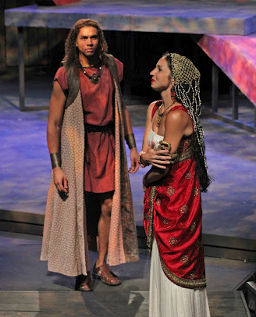
A late summer matinee of Troilus and Cressida is presented outdoors at American Players Theatre in high humidity, the temperature well into the nineties. The production is staged deep within a southern Wisconsin wood, the set shielded by a billowing sail high overhead, giving a nautical air as well as protecting the stage from the heat of the midday sun. Unfortunately, the afternoon performance does not benefit from Michael A. Peterson's lighting design, dark due to the stage canopy. APT offers its audience a free water station near one of the gift shops and makes public address announcements to encourage patrons to seek help if not feeling well.
William Brown wisely directs the difficult-to-classify Troilus and Cressida as a tragedy, the titular romance doomed within the context of a meaningless war ("and that's the quarrel"), the only humor coming from the outbursts of the panderer Pandarus or at the expense of the oafish Ajax. Brown interlaces nightmare visions from the dark-eyed beauty Cassandra - "cry, Trojans, cry!" - with the debauchery of both sides, providing glimpses into each camp. The men appear like 1980s big-hair rock stars, lounging bare-chested in short togas, some of their hair looking permed, most of it enhanced with extensions. The muscle-bound Greeks wear rust and gold, and they range from the decorum of Agamemnon and Ulysses, to the brawny bluster of comic-relief Ajax, to the world-weary ennui of Achilles and his nearly naked "masculine whore" Patroclus.
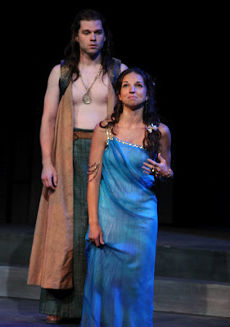
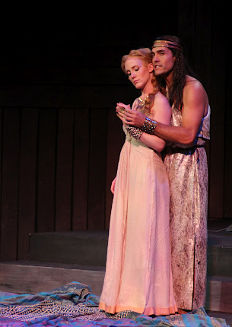
Jim DeVita's scene-stealing Pandarus provides a fight-night introduction - a kind of roll call to drum beats - for the main characters from Troy, introducing each returning soldier as he enters from the blazing sunshine at the rear of the audience. The Trojans prove as crude as their Greek counterparts, with the exception of the noble Hector and the Romeo-like Troilus, and they wear blue and gold togas. In 3.1 Pandarus croons an ironic ballad - "Love, Love, Nothing But Love" - while the blonde Helen ("love will undo us all") gives Paris a sexy lap dance, then pulls the shirt from a manservant until all three are kissing and entwined and writhing in a moaning heap upon the stage.
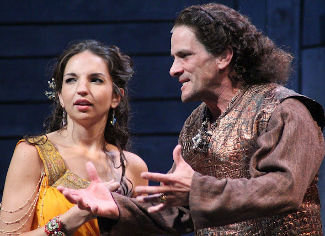
The affair between Cressida and Troilus is presented as wholesome and all the more tragic: DeVita's Pandarus brings them together in 3.2, but he has to catch the veiled Cassandra, wearing a clingy blue gown, when she attempts to flee, and then prevent Troilus from stomping off in frustration. DeVita's Pandarus is like the Nurse from Romeo and Juliet, a trusted old relative with a clever tongue, but with an affliction that causes him to clutch his side and cough and choke. The scene is played for humor - "have you not done talking yet?" - and some light romance, with the handsome young Troilus silencing Cressida with a kiss. Pandarus encourages them to consummate their relationship - "seal it! seal it! I'll be the witness" - as Troilus carries Cressida offstage to bring intermission.
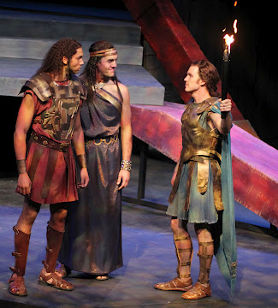
The second half of Brown's production begins with sudden martial music that startles the audience. Brown wastes no time, moving directly into the downward spiral of the tragedy with Cressida to be exchanged for prisoners. She is finally separated from Troilus - Pandarus: "my sweet ducks!" - in a scene that recalls the day-after exchange between Romeo and Juliet, debating the lark and the nightingale. During 5.2, the lovely Cressida returns to the stage tarted up, veiled in gold, wearing red lipstick and a bosom-hugging blouse. When she gives Diomedes her favor from Troilus - a coiling golden arm-band in the shape of a serpent - and kisses him, Nate Burger's concealed Troilus cannot bear to watch.
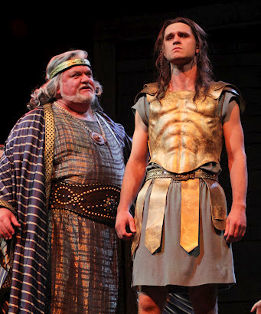
After Thersites imitates Ajax, grunting and posing and kissing his biceps, Brown builds the tension of the looming battle with the 4.5 single combat between Ajax and Hector. The Greeks chant "Ajax! Ajax!" as the shirtless champion struts through the audience only to be humbled by a Trojan. The uneasy camaraderie afterward includes a coy exchange between Achilles and Hector, the confident Greek telling Hector all the different ways he could kill him, then smirking at Hector's clever retort: "I'll kill thee everywhere." They all seem to savor the impending battles, brawling and talking too much - Thersites on Ajax: "he is not so much brain as earwax" - and certainly drinking to excess. Achilles and Hector ultimately reveal mutual respect, Achilles first sipping from Hector's cup, then flinging the contents aside and offering some of his own drink, and they then share appreciative nods.
Brown's concluding battle begins amid trumpets and the sudden onslaught of skirmishes both onstage and in the aisles, a melee of swarming soldiers in helmets, carrying shields and spears and swords. The Greeks cry out "Helen!" in the fast-paced mayhem, Troilus proving a hero by fighting off two Greeks at once. Hector also proves victorious, not over Achilles but his lover Patroclus, whom he unmasks in a sweaty tangled heap on a center-stage ramp. Moments later, Achilles and the Myrmidons take their revenge, continuing a vicious cycle, and Burger's Troilus - destroyed in heart and soul, like Hamlet if he had lived - cringes at the sound of Hector's body being dragged behind a galloping horse. Brown's riveting anti-war tragedy concludes with Burger's now hateful Troilus beginning his own chilling war cry of "Hector! Hector!" DeVita's Pandarus has the final word, bequeathing venereal disease to the audience while picking the pockets of the battlefield dead.
A version of this article was edited and published in Shakespeare Bulletin, Vol.30, No.4, Winter 2012